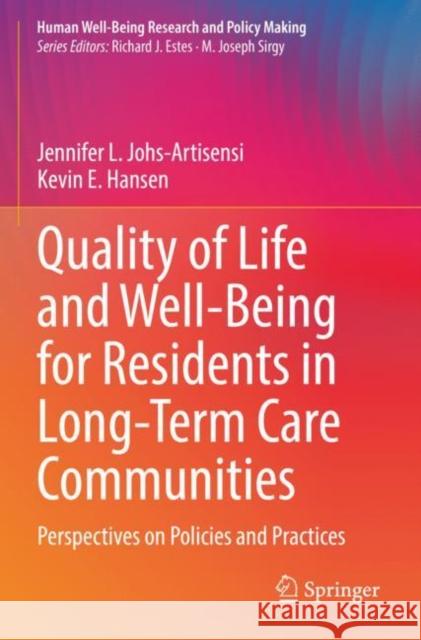Quality of Life and Well-Being for Residents in Long-Term Care Communities » książka



Quality of Life and Well-Being for Residents in Long-Term Care Communities
ISBN-13: 9783031046971 / Miękka / 2023 / 195 str.
Quality of Life and Well-Being for Residents in Long-Term Care Communities
ISBN-13: 9783031046971 / Miękka / 2023 / 195 str.
(netto: 230,54 VAT: 5%)
Najniższa cena z 30 dni: 231,29 zł
ok. 22 dni roboczych
Bez gwarancji dostawy przed świętami
Darmowa dostawa!
Table of Contents
Kevin Hansen is Associate Professor and Chair of the Department of Health Care Administration and Public Health at Bellarmine University. His research primarily focuses on quality of care and quality of life in nursing homes, as well as abuse and neglect of vulnerable adults and substitute decision-making with powers of attorney, health care directives, and guardianships and conservatorships. Dr. Hansen has taught courses related to health law and policy, quality improvement in long-term care organizations, leadership in health care settings, ethical and legal issues in aging, elder abuse and neglect, legal issues within health care administration, risk management in health care, and long-term care facility operations. Dr. Hansen has previously taught at the University of Wisconsin-Eau Claire and at the University of South Florida. He has worked as an attorney and ombudsman specialist with the Minnesota Ombudsman Office for Mental Health and Developmental Disabilities, and as an attorney and victim advocate at the ElderCare Rights Alliance. Kevin has worked in the areas of elder and disability law conducting research and pursuing legislative reform in Minnesota. Dr. Hansen earned his Ph.D. in Aging Studies from the University of South Florida, a Juris Doctor from the William Mitchell College of Law, and a Master of Laws in Elder Law from the Stetson University College of Law.
This book explores key factors long-term care recipients have identified as impacting their quality of life and offers programmatic and policy recommendations to enhance well-being within long-term care communities. Leadership and staff who work in nursing homes and other residential care communities serve as gatekeepers to resident well-being, often without recognizing how residents’ quality of life is impacted by their decision-making. This book takes a life domain approach to build on research-based studies that document key drivers of care recipients’ quality of life, including relationships, autonomy and respect, activities and meals, environment, and care. Using a framework that enhances understanding of resident quality of life, it outlines practical, programmatic, and policy suggestions for long-term care stakeholders, such as administrators, managers, front-line staff, family members, and policy-makers, whose directives and actions impact the lived experience of long-term care residents. As such, this book serves as a roadmap for leaders and managers of long-term care communities, along with policymakers who regulate health and human services, to best structure care environments to maximize quality of life and well-being for long-term care recipients.
1997-2025 DolnySlask.com Agencja Internetowa
KrainaKsiazek.PL - Księgarnia Internetowa









